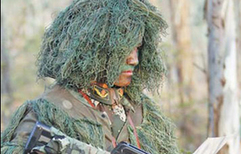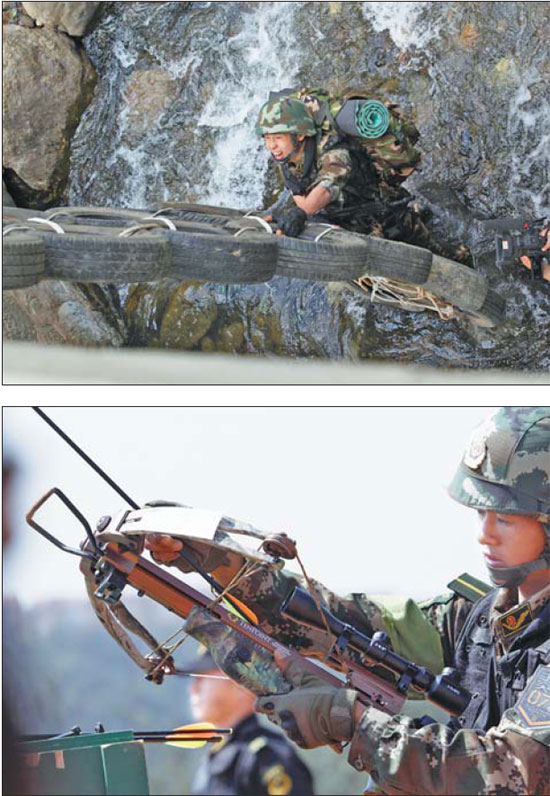Action men
|
From top: Competitors on the show have to go through arduous physical drills. A participant is ready for a crossbow shooting test. |
In the first few episodes, cadets were put up against arduous physical drills. It's pushing the body's limits for sure, but the nonstop sprinting, grappling, long-range raids, shuttle runs and hour-long action enhance each part of the students' physical ability.
"They're trained like athletes in many ways," Zhang says.
The second tier of the pyramid includes shooting, wrestling, and devising battle tactics - exercises that often require 80 percent scores to pass.
Then comes the hardest step of a commander's growth, the training of one's mind.
 |
| A soldier's life |
The armed police force is fearsome because they appear to have no fear at all. There is no cowering reflex when there is shooting. They sketch up rescue plans even as the ground crumbles. When alone and out of touch, they're never at a loss.
But they're not genetically wired to be brave and resourceful. "They still have fears," Zhang says, "they just know how to control them."
Psychological drills cover control of the mind, negotiation skills, teamwork and second-nature reactions to specific situations.
In scientific terms, it's desensitization.
In practice, that means endless simulations.
Soldiers' Sortie, being a show that aims for effects, has young soldiers go through a gauntlet of barking, menacing police dogs and immediately solve a puzzle, deducing a criminal's whereabouts from a published piece of news. It has them tethered high above the ground, ready to tackle a scheme.
Commanders-to-be are subject to being caged in a dark room with fake dead bodies, sudden sloshing of blood from a fake enemy, and they're often put in the shoes of an enemy trying to squash its own comrades.
"Psychological drills will have them face death, bloody fights and laser battles," Zhang says.
"Simulation training greatly improves their capability."
Even in the simpler versions on TV, the tactic of simulation works.
In one scene, soldiers were given three seconds to shoot moving targets at a rundown house: Hit three out of five targets and escape elimination.
One top shooter with eight years in the army, Wang Shuang, nailed it. Taking pride in his perennial calm, he says afterward, "Point and shoot, you have to be quick."
Mei Shibao, a first-year cadet at the school, admits stress took its toll on him and he felt himself "blank-out" when the clock started ticking.
"We are not born brave and agile, but are trained to be," Zhang says. "From the TV program, you can deduce clearly the kind of commander we want."
The star commander will pass physical tests though he may not excel at them. His strong suit would be an invisible weapon: what he has in his mind.
"He will have composure whatever comes in his way, have a general grip of the situation, calmly deploy his resources and never, ever lose his head," Zhang says.
A soldier's psyche is so important that "battle of the mind" became the program's tag this season. Zhang was given the task last October after the first season of Soldiers' Sortie was aired to good reviews. He says: "A commander really matures when his psyche is in place."
Such a state of mind might be the real prize students seek. Participants say that they're entering the show for the training and experiences that will make them stronger.
Of course, the academy hasn't put all of its training agenda on board.
"It's just the tip of an iceberg, the weapons are first-generation," Zhang says. "We have a pact to prevent revealing too much. You see three elementary training sessions - we have hundreds in the pool."
But you can certainly see from the show, he says, how a CAPF commander takes shape.
The show airs every Friday night on Yunnan Satellite TV.

















